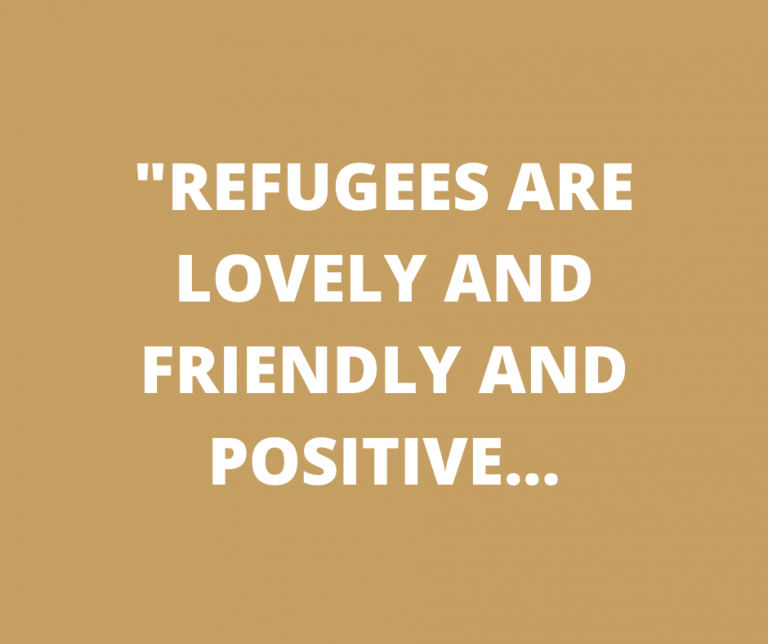
In light of the recent news coverage on the refugee crisis, we thought it was appropriate to share this contributor’s story about their time spent at a Calais refugee camp. This story gives us an important reminder that refugees are human, despite being demonised in much of the mainstream political narrative. This is also a useful reminder of our privilege and of the hardship these people face. Many thanks to our contributor for sharing their story with us in such an honest and thought-provoking way.
First visit to Calais Refugee Camp
“In 2015 after seeing countless news stories about the refugee crisis, me and my friend decided to spend a month of our university summer volunteering in Calais refugee camp. It was the first time either of us had done this kind of work and we were a bit nervous, if I’m completely honest I expected to be harassed because of my gender and experience some sexist comments. I consider myself a left wing person and upon arriving out there it was a shock to realise that I had this racism inbuilt into my outlook and that I had expected to be treated badly by the people I came to help. This was definitely fuelled by negative portrayals of asylum seekers and refugees in the media, and I guess these societal messages become part of your subconscious without you realising, and when you don’t meet anyone to disprove it these racist beliefs remain.
When I got to Calais the sheer generosity of the people we met who had nothing was overwhelming and the complete opposite of what I’d expected. People invited us for tea and food with no expectation of anything in return, people were very friendly and trying to put a positive face on whenever they could, people were building their own shelters and cafes and restaurants. This is not to say the camp feeling was utopic at all. There were occasional fights and fires set arising from the frustration of the appallingly organised camp and inhumane border policies and violent abusive police. When you go and meet first hand people who have been beaten up by the police and had their shoes taken by them it does effect you in a much more profound way than just reading these stories in the newspapers. Women who were not white western volunteers were treated appallingly in lots of cases, it wasn’t considered safe to walk around at night alone as a woman but I always felt very safe there in the day. It really opened my eyes to how people and places can have an amazing community spirit which coexists amongst struggles and serious problems. You get a window into the reasons why people might do “bad” things, but not be “bad” people at all, it made me more empathetic.
Whether I made much difference to the people I met is another story. I was delivering basic aid, often people wouldn’t even have tents to sleep in for the first evening they arrived as we would have run out. I tried to be as friendly and helpful as I could. There is lots written about white saviourism and the ‘tourism’ of visiting refugee camps taking some selfies and then returning to life as normal .. and I can see this could be an issue sometimes.
Having asked refugees, and there is some clear guidance on how to be a good human in these situations:
1. don’t ask personal questions about family or their journey,
2. be polite and friendly and helpful assume the best of people,
3. teach and distract people if they’re up for it.
But don’t beat yourself up too much if you’ve find you’ve acted in this way, it’s natural to be curious and as I said earlier we in the UK often come into these situations with a racist outlook unintentionally, it’s important to listen, reflect, and admit when you were wrong in these situations and we shouldn’t hound anyone who follows this. For me it is a grey area because sometimes coming to Calais for a few days and really experiencing the awfulness of it can inspire so much action back at home. And action back here is what we need – our government sells arms to countries bombing innocent people, our country is home to and subsidises fossil fuel companies that are causing parts of the world to be uninhabitable, and our MPs are inhumanely refusing refugees to settle in the UK (often even when they have family here already).
It can be distressing to realise that these people are in such horrific situations partly because of the way we live our everyday lives in the UK, and that people don’t care about this as much as they should. Find people who feel the same way as you and to talk to them, remember that even small actions can lead to a greater focus on refugees. Some of my old students have made it out of these camps, been reunited with their families, some have become volunteers themselves. There is hope when we embrace our humanity and love and forgiveness and empathy and work together with a shared vision.
So if you do go, go with an open outlook without expectations, try and go for a long as you can that’s sustainable for you, try to organise stuff at home (collections, fundraisers, letter writings) before you head and once you come back. If you go for a short time don’t always expect to be on the refugee facing side of operations, familiar faces and people who have been trained and know how to be sensitive and empathetic are the people who should be interacting with refugees. Refugees are lovely and friendly and positive, but they are still in a vulnerable, powerless situation and can’t just hop on a plane home after doing a stint in a camp.
On the other hand it does make sense to want to meet the people, because sometimes the human stories and personal experiences are the best motivators. It led to me fundraising for refugee charities such as ‘Help Refugees’ and volunteering at a refugee centre in London, encouraging others to volunteer, going on marches for refugee rights, and eventually I spent seven months living in Athens volunteering in a refugee camp there.
Over the past few years, my key focus has changed to environmental issues, partly because sometimes you have to just pick one issue, and also because it does link to the needs of refugees. Sometimes being at the camps felt like trying to solve a massive crack with a plaster. The socioeconomic and driving factors are the most important in helping refugees, and climate change catastrophe will sadly cause millions more refugees.”
To read or share true life stories please visit stozzys.com.
If you’d like to learn more about volunteering in a Calais refugee camp, or elsewhere, you can do so via Help Refugees.
